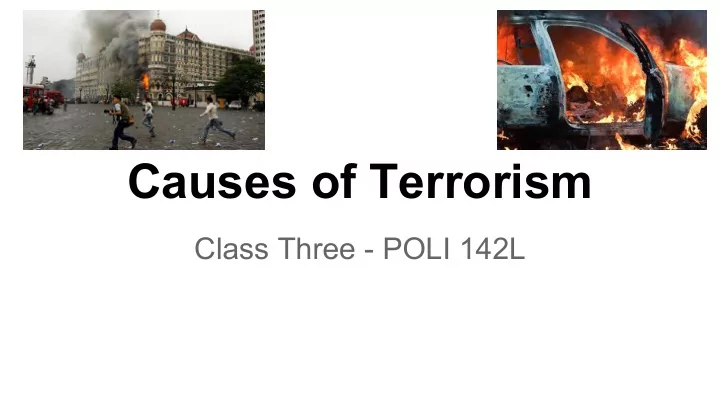

Causes of Terrorism Class Three - POLI 142L
Review ● Definition of Terrorism ● Goals of Terrorist Movements ● Characteristics of Terrorist Movements
Terrorism in History: Anarchist
Second Wave: Ethno-nationalist
Third Wave: Left-Wing
Fourth Wave: Religious/Islamist
Two ways of approaching causality ● Preconditions: ○ Set stage in long run, but don’t necessarily cause anything. ● Precipitants: ○ Direct causes of the activation of movements.
Crenshaw’s three causes...
Crenshaw’s three causes... ● Grievances. ○ i.e. discrimination ○ Not a necessary condition ● Lack of political opportunity ○ Paired with ineffective repression. ● Elite dissatisfaction ○ “Passive masses” ○ Terrorism to mobilize support.
Oppression is not needed for terrorism ● Groups mobilize support through attacks. ● Attacks can lead government to use repressive tactics. ○ This mobilizes more supporters.
Nationalism and Colonialism - Hoffman ● End of WWII generates independence demands from British and French colonies. ● With no independence, former fighters carry out attacks against colonizers
Three Examples ● Irgun in British Palestine ● FLN in French Algeria ● EOKA in British Cyprus
Tactics of Nationalist Terrorists ● Attack targets symbolic of colonialism ● Provoke occupier into repression of civilian population. ● Assure negative public opinion in home country.
Democracy and Terrorism ● Statistically, democracies experience more terrorist attacks than non-democracies (Eubank and Weinberg 1994; 2001; Li 2005) ● Theoretical explanations crop up to explain. What are some potential problems with that statistical conclusion?
Enders and Sandler (2006) Characteristics of liberal democracies: ● Rule of Law ● Freedom of Speech ● Freedom of Movement ● Electoral representation. How do these apparently contribute to terrorism?
Democratic Dilemma ● Respond slowly and lose legitimacy, respond too quickly and lose support. ● Violations of civil rights “needed” to fight terrorism are domestically unpopular.
Terrorist Movements can use free media
Discussion: Is democratic dilemma credible? How does it speak to grievance or nationalism explanations?
Discussion II: ● What do you think leads to terrorism? Political liberalism or political exclusion? ● Were colonial powers that were democracies at home restrained in fighting terrorist movements abroad? Why might fighting domestic movements be different?
Case: Northern Ireland The Troubles
Background: Ireland as part of UK ● Britain ruled Ireland for centuries until the early 1900s. ● Catholics (75% of the population) faced legal and then informal discrimination.
Easter Rising and Independence War ● 1916: Easter Rising against British Rule put down. ● 1919-1921: War of Independence. IRA secures home rule for Southern Ireland.
Northern Ireland remains part of UK ● Six northern counties don’t secede. ● Populated by Protestant loyalists to the crown. ○ Catholic minority. ● Retain self-government through local parliament in Belfast.
NI society dominated by Protestants ● Catholics discriminated from public housing, employment. ● RUC (police) dominated by loyalists. ● Elections for local parliament gerrymandered, malapportioned.
Civil rights movement in 1960s ● Catholics demand political and social rights. ● Unionist terrorists emerge to attack protesters.
Actors in the Troubles Irish Republican Army and Northern Ireland government splinter groups IRA foreign backers British government Ulster Volunteer Force and splinters
Irish Republican Army ● Initially non-violent. ● Split between Provisional and Official IRA in 1969. ● PIRA committed attacks on loyalist and British military targets. ● Political wing: Sinn Fein Party.
Northern Ireland Government ● Dominated by Unionists. ○ Especially Royal Ulster Constabulary (police force) ● Opposed settlement with Catholics. ● Used repression against peaceful protesters.
UK Government ● Initially militarily intervene to restore order. ● Target for both sides. ● Favor settlement between Catholics and Protestants with NI remaining in UK
Ulster Unionist groups ● Carry out attacks on Catholics suspected of ‘militant activity’ ● Vehemently support protestant rights. ● Political wing is Democratic Unionist Party.
IRA Foreign Support ● Funding comes from Irish diaspora, especially in US. ● Training from ETA and other nationalists. ● Some weapons from Gaddafi...
The Troubles ● Civil rights protests by Catholics repressed by RUC and other loyalist groups. ● Ulster Volunteer Force begins carrying out bombings in 1966 against Catholic targets.
Riots in 1969 and UK intervention ● Police brutality against Catholics leads to riots in Belfast. ● Protestant and Catholic supporters fight on the streets. ● British military intervenes to calm violence.
Terrorism escalates from both sides ● PIRA targets loyalist and UK targets. ● UVF and other loyalist groups attack Catholics. ○ i.e. Shankill Butchers. ● UK suspends NI Parliament in 1972. ● UK-brokered Sunningdale agreement fails in 1973 after loyalist opposition.
What do you think drove IRA terrorism? Loyalist terrorism?
What role did democracy play in the Troubles? Were liberal institutions a constraint or an opportunity?
Exam on Wednesday: ● Worth 0-15% of grade, depending on other results. ● 5 short-answer questions: choose three. Two essay questions: choose one. ○ Reflects discussion questions on syllabus. ● 50 minutes.
Recommend
More recommend